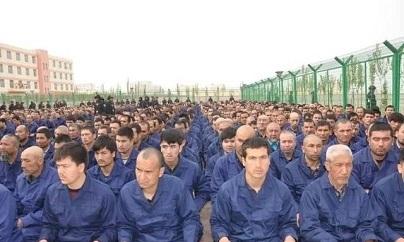Ethics Of U.S. Drug Trials In China Questioned By Congress
U.S. drug companies have cooperated with the People's Liberation Army in experimenting on Uyghur people of northwestern China.

A bipartisan House of Representative select committee on China has asked the Biden administration to more closely scrutinize, through the U.S. Food and Drug Administration, American drug companies and their clinical trials in cooperation with the Chinese Army in a region where China is “engaged in genocide of the Uyghur people.”
In the August 19 letter from Chairman John Moolenaar (R-MI) and Ranking Member Raja Krishnamoorthi (D-IL), the committee members raised serious concerns that the People’s Liberation Army (PLA) is stealing sensitive intellectual property owned by U.S. companies while conducting possibly unethical experiments in Xinjiang: the remote region in central and northwestern China where thousands of Muslim Uyghur people have been rounded up and kept in concentration camps by the Chinese Communist Party.
The letter claims that U.S. drug companies have coordinated with hospitals and clinics operated by China’s military to conduct hundreds of clinical trials over the last 10 years, including on the minority Uyghur people. Neither the FDA nor China’s embassy have released a public response. "Given the historical suppression and medical discrimination against ethnic minorities in this region, there are significant ethical concerns around conducting clinical trials in (Xinjiang)," Moolenaar and Krishnamoorthi wrote in the August 19 letter, which was addressed to Robert Califf, who oversees the FDA.
The letter went on: "These collaborative research activities raise serious concerns that critical intellectual property is at risk of being transferred to the (People's Liberation Army) or being co-opted under the People’s Republic of China’s National Security Law." China has denied any mistreatment of the Uyghur people.
The Chinese government forces ethnic minorities in Xinjiang to participate in gruesome medical procedures, which likely overlap with FDA-approved research. There have also been widely circulated rumors that Chinese security forces harvest human organs from dissidents held in prison.
The lawmakers write, “For over a decade, it appears that U.S. biopharmaceutical companies conducted clinical trials with China’s military organizations, and specifically with medical centers and hospitals affiliated with the People’s Liberation Army’s (PLA), to determine the safety and effectiveness of new drug candidates prior to approval… These collaborative research activities raise serious concerns that critical Intellectual Property (IP) is at risk of being transferred to the PLA or being co-opted under the People’s Republic of China’s (PRC) National Security Law.”
“Conversely, there are also concerns with the trustworthiness of clinical trial data produced overseas from PLA institutions. The FDA has previously declined to approve oncology treatments based on clinical trial data solely produced from clinical trial sites in China, suggesting the FDA should also impose similar scrutiny to clinical trial work done in cooperation with the PLA,” the letter continued.
Concern over China’s mistreatment of minorities, such as the Uyghur people and members of the Falun Gong spiritual movement, has grown. In April, the committee requested that the Biden administration add seven Chinese biotech firms to a list created by the Department of Defense that are alleged to coordinate with China’s military. Congress is weighing proposed legislation that would restrict American businesses with Chinese biotechnology companies, including WuXi App Tec.
"In addition to work with the PLA, there are also U.S. biopharmaceutical trials listed on clinicaltrials.gov that were conducted with hospitals located in the XUAR, where credible investigative reports have shown that ethnic minorities in the region are repeatedly forced by the CCP to surrender their body autonomy," the letter said.
Wu Xi App Tec’s website claims that it enables innovation: “As a global company with operations across Asia, Europe, and North America, WuXi AppTec provides a broad portfolio of R&D and manufacturing services that enable the global pharmaceutical and life sciences industry to advance discoveries and deliver groundbreaking treatments to patients.”
Publicly available information on the FDA’s website, ‘clinicaltrials.gov’, reveals that major U.S. biopharmaceutical companies have conducted hundreds of clinical trials alongside a PLA entity over the last 10 years. In addition to work with the PLA, the lawmakers identified U.S. companies conducting clinical trials in Xinjiang. The CCP forces ethnic minorities in Xinjiang to participate in gruesome medical procedures, which likely overlap with FDA-approved research.
The committee gave the FDA until Oct. 1 to answer the following questions:
Has the FDA reviewed clinical trials involving the PLA or PLA facilities or conducted on-site inspections of PLA facilities?
Has the FDA ever been denied access to foreign clinical trial sites in the PRC, including but not limited to trial sites located on facilities affiliated with or owned by the PLA?
How many PLA-owned, operated, or affiliated facilities has the FDA reviewed for clinical trial work?
What is FDA’s estimated average cost for adjudicating a clinical trial conducted in the PRC?
What is the earliest date for which the FDA received clinical trial data that included PLA organizations?
Given FDA’s regulations for ensuring that clinical trials are conducted according to ethical and safety standards, has the FDA ever notified any U.S. biopharmaceutical organization that it has conducted studies with the PLA or in the XUAR? If so, please provide the number of notices and time periods when they were issued, and if companies were responsive.
What metrics does FDA use when assessing IP and technology transfer risks? Within those metrics, how are the risks calculated when research studies identify collaborations with the PLA or involve PLA-owned facilities as the setting for the research?